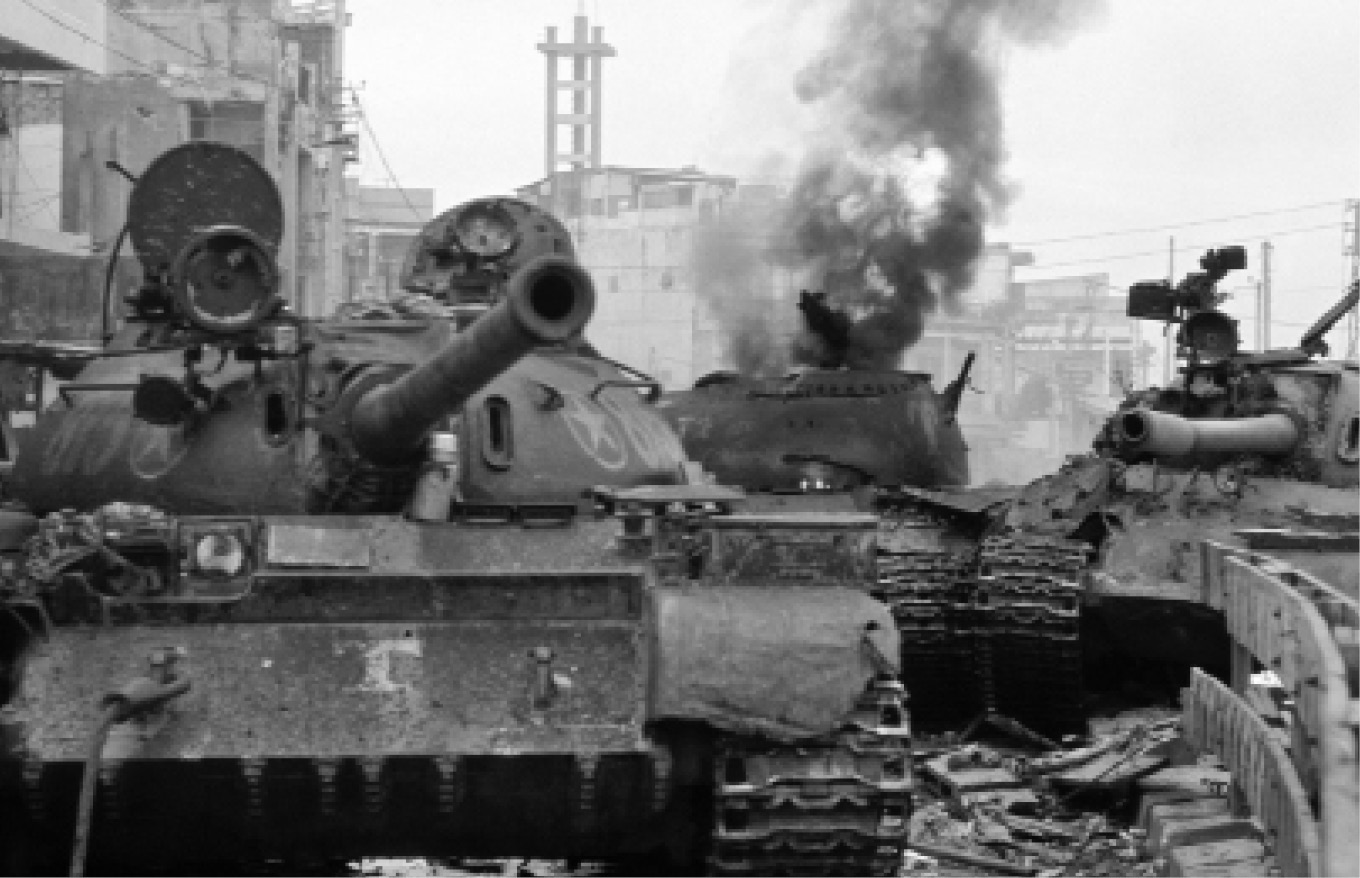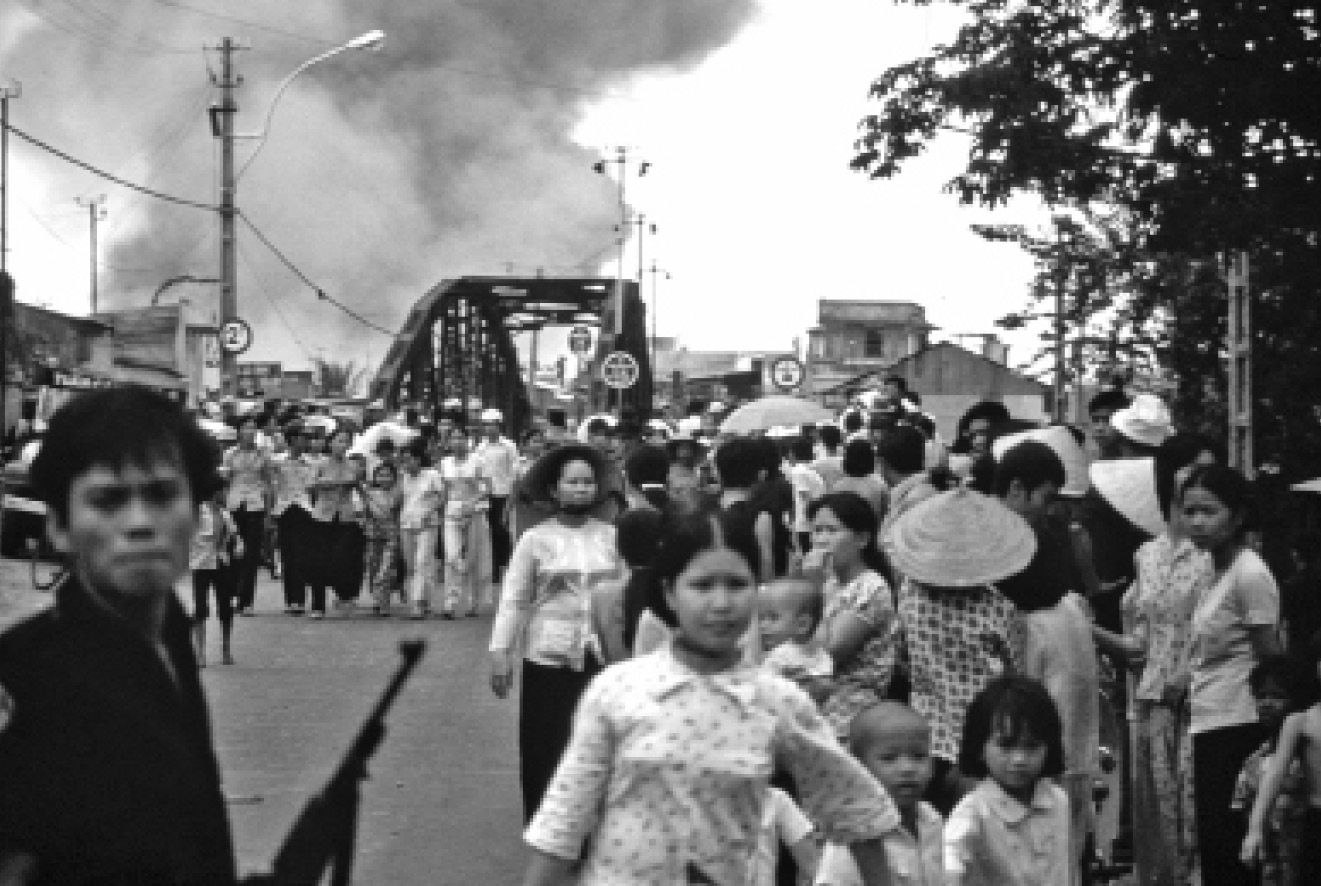Chapter Two
When Things Changed
April 11, 1975
Tuyet didn’t know about the world beyond her building. But she could hear the soldiers, helicopters, gunfire, and explosions. She had always lived with those sounds in the background.
On the day her life changed, the doors of the orphanage were opened, but instead of soldiers with candy, the children saw a white Volkswagen van screeching to a halt. A man jumped out. He wasn’t a soldier or a priest, and he didn’t look Vietnamese. He called out to the nuns in a language Tuyet did not understand. Beyond the van, the streets were full of people running. Many carried suitcases; others carried children. Some of the people were weeping while others were screaming.
The man helped the nuns rush around, packing diapers, formula, water, and bedding. Everything was placed by the door. Tuyet and the older children stared in confusion as the adults gathered boxes and lined them up at the entrance. The nuns carried the babies from their sleeping area and bundled them in blankets. Then each baby was placed in a box. Some boxes were big enough for two babies.
The man had a handful of plastic straps. He read aloud the name printed on each strap, and then a nun would find the right baby and attach the strap to the baby’s wrist.
“Son Thi Anh Tuyet,” said the man.
Tuyet looked up in surprise. Why was he calling her name? She wasn’t a baby. One of the nuns walked up to her. “Let me have your arm,” she said. “You’ll be going, too.”

2-1 — North Vietnamese tanks enter Saigon
Tuyet rubbed the snug plastic wristband as the adults loaded the boxes of babies into the back of the van. Suddenly, the man lifted Tuyet into his arms and carried her to the van. Tuyet looked back over his shoulder at the other children—the girls she had slept with for as long as she could remember, that one special boy who had played with her. They all stood huddled together, round-eyed with fear. Was it better to go or stay behind?
As the man set her down on the floor of the van, Tuyet’s special friend rushed forward and thrust a small package into her hand.
The back of the van was hot and stuffy, and it was packed so tightly with the boxes of babies that the corner of one box jabbed painfully into Tuyet’s hip. But she sat obediently where she had been put. Her left foot and leg hurt most of the time anyway, and she had learned to suffer in silence.
The man climbed into the driver’s seat. Tuyet leaned over to get a view of the passenger seat. A frail newborn had been strapped carefully in place beside him.
The van jerked forward. Tuyet turned to stare out the back window as the van slowly pulled away from the orphanage and into the road thick with people and cars. She waved goodbye to her special friend, the nuns, and the other children. She tried to watch them for as long as she could, but the van rounded a corner and the nuns and children disappeared.
Tuyet looked down at the small package she held in her hand, and opened it. Inside was a rosary—a necklace to use for counting prayers—made with pale coral and crystal beads. It sparkled like the gold stars the nuns would award for good work. Tuyet could feel the tears well up in her eyes. Would she ever see that boy again? She let the cool beads slip through her fingers and, for a moment, she thought of nothing but the boy’s face. She would try to remember him always. She slipped the shiny beads back into their package and tucked it deep into the pocket of her pants.
Tuyet was jolted out of her thoughts when the van lurched sideways. She gazed out the window at the tangle of traffic and frantic people. In the distance, flames licked up the sides of buildings and smoke billowed high above. Although the sound of gunfire was everywhere, Tuyet felt safe in the van. But she was hot and her hip was sore. She shifted her position so the box wouldn’t jab into her so much.

2-2 — South Vietnamese civilians flee as Saigon falls to North Vietnamese forces
Some of the babies began to wail. The toddlers squirmed and tried to get out of the boxes, but they were packed in so tightly that there was no place to squirm to. The driver was concentrating on the road; there was no one but Tuyet to help the children and babies. She tried to calm them by singing softly and caressing the tear-streaked cheeks closest to her. But they were as hot as she felt. Probably they were as thirsty as she was, too.
Tuyet looked back out the window and marveled at the variety of people in the street. Most of the women in the orphanage had been nuns, with their starched white habits and clinking beads. The priest was always in robes and the other men were in their American uniforms. But here, the Vietnamese men wore white shirts and dark pants. The women were in long baggy trousers and pastel-colored tops, and their lush black hair hung down their backs. Some wore conical bamboo hats. Wherever they were going, the way was clogged with others going in the same direction.
It seemed like hours, but finally the driver sighed with relief and said something Tuyet couldn’t understand. He pointed out the front window.
In front of them stood tall fences topped with barbed wire. People crowded around, trying to push their way through the gate. The soldiers pushed back with their guns. Many of the people reached for the tall wire. One man threw his suitcase all the way over the fence. He clutched onto the wire and pulled himself up. He was almost at the top when a soldier caught him and dragged him down. All of the people appeared frantic to get to the other side.
The van pulled up to a locked gate. Soldiers held back the crowd and the van inched forward. The driver rolled down his window and showed a piece of paper to one of the soldiers. That soldier pushed through the crowd and unlocked the gate, sliding it back just far enough for the van to drive through. The van swayed as people jumped on top of it. Some pounded on the window, and Tuyet hid her face in her hands. Finally, the van was on the other side of the gate. Tuyet looked back to see a soldier pull the fence closed again as another held back the crowd.
Without all the people, it seemed suddenly still. The noise from the outside was gone, making Tuyet more aware of the babies and toddlers in the boxes.
“It’s all right,” Tuyet said in a cooing voice, hoping to comfort the hot and frightened infants. But she had no idea if it was all right.
The van drove across a wide empty space and pulled up in front of a strange winged building with a huge door that yawned wide. Many foreign-looking adults scurried about, some carrying toddlers or boxes of babies, others standing by, hands on hips.
Their uniforms made the American soldiers look alike. But Tuyet had noticed before how different their skin looked. Some were pale pink or almost white; others were brown and black. Few were golden like her. And they were always men.
The foreign adults were mostly female. They had pale skin splotched with pink and pale wispy hair in different hues—yellow, orange, brown, and white. Instead of uniforms, they wore complicated clothing, like flowered skirts and pastel dresses with straps, buckles, and ribbons. But their faces still looked the same to Tuyet.

2-3 — Hercules C-130 aircraft
The back door opened and a whoosh of fresher air enveloped her. A man who wasn’t a soldier reached in and grabbed one of the boxes that held two tiny babies. Holding the box with care, he rushed to the ramp that led into the winged building. A woman came forward, and then another, and another. As each wrapped her arms around a box, Tuyet pushed the remaining boxes forward so they would be easier to reach. Soon, all the babies were out of the van and Tuyet was left sitting by herself. She wondered if she had been put in the van just to help with the boxes. Would she be going back to her old home now? Back to her special friend?
Other vans and cars pulled up. Workers ran up to those vans and quickly unloaded the children and babies with efficiency. Some older children hopped out, and Tuyet strained to see them more clearly.
But she recognized no one.
A cloud of orange hair poked into the back of Tuyet’s van. A hand fluttered to hold the hair in place briefly. Tuyet stared into startling blue eyes and a pink face damp with sweat.
“It’s your turn, now,” the woman said in Vietnamese. Tuyet scrambled toward the woman, who held out her arms to carry her. But Tuyet shook her head.
“I will walk,” she said.